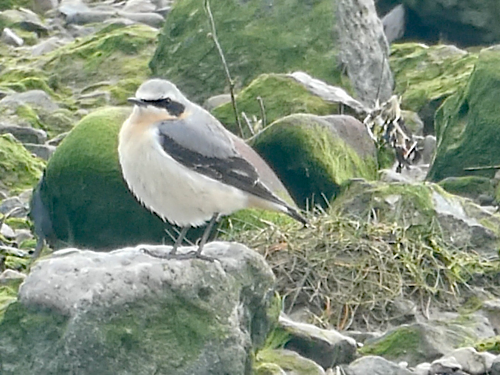Light ENE to SE wind, perhaps today's title is a slight exaggeration, there was a little high cloud mid morning.
South shore towards high water (MD)
Pale-bellied Brent goose 19 - when the tide flushed them from Red Nab they just drifted out in a raft. Unlike the typical behaviour of the regular feeding birds here, who then fly off to feed at Potts - later there were 5 resting on the skear.
Wigeon 20
Shag 1 juvenile preening on the wooden jetty. This clip is just to show its typical location on the jetty, it is just about centre on this clip. Also, a good selection of cormorant plumages.
Wheatear 1 male. He obviously has his feathers fluffed out, but there was no getting away from it, he was a large individual.
 |
| A plump male Wheatear |
Pete advises that a strong NE wind across the English Channel is blocking a lot of migrating birds, with a risk of some being blown out to sea (e.g. Osprey)
Golden Plover 1 turning to summer plumage - Pete had this bird, originally as "seen from" the recording area as it rested on the Sunnyslopes groyne. It then flew into the recording area, heading towards the children's play area before heading back north. It was later relocated near the battery. Golden Plovers are very scarce in the recording area.
 |
| Golden Plover - as seen by scope from the recording area |
Middleton Nature Reserve
Kevin braved the sunny Sunday afternoon throng, despite the disturbance managed a couple of interesting records.
Chiffchaff 3 singing
Green Woodpecker 1 calling
Heysham skear (MD)
A lovely evening stroll, but only the regular birds to enjoy
Brent geese, 2 and 3 resting on the skear
Eider 250+
Great Crested Grebe 8
Red-breasted Merganser 8
Little Egret 5
Swan sp 1 - just as I was arriving back at the sea wall it flew overhead from SE. It called, so not a Mute, almost certainly a Whooper, but it was quite dark by then and camera was stashed away.
So, the Spring Equinox! Sunrise 06:15, Sunset 18:24. The 9 minutes discrepancy because sunrise is timed as the moment the tip of the sun appears over the horizon, whereas sunset is timed at the moment the last tip of the sun disappears. So, according to today's figures, it must take 9 minutes for the disc of the sun to cross the horizon.